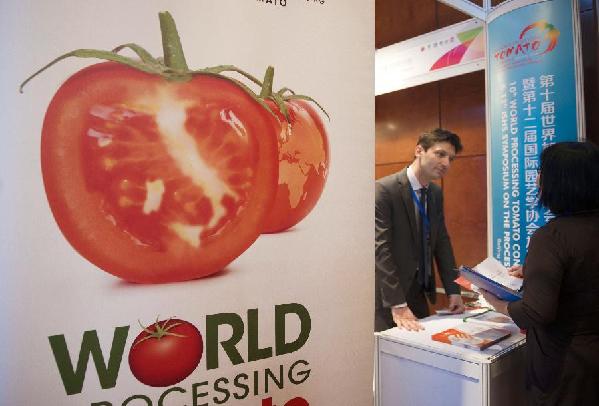| Tomato processors eye emerging markets amid economic downturn | |||||||||||
|
|||||||||||
http://english.dbw.cn銆€銆€
2012-06-11 10:22:05
|
|||||||||||
|
The congress was held in Beijing for the fist time, which shows that tomato processing companies have attached greater importance to both the Chinese market over recent years and the roles Chinese companies play in the sector, China's Vice Commerce Minister Jiang Zengwei said at the opening ceremony. More than 300 delegates, including business executives, association leaders and experts, attended the biennial event. Jiang said huge tomato processing development potential can be seen in emerging markets, such as countries in the Middle East, Africa and Asia. "Take China for example, the average annual consumption volume of tomato sauce is 0.6 kg per capita for China's population of 1.3 billion, far less than the 20 to 30 kg in European and American countries," he said, encouraging companies to further develop China's processed tomato market. Ning Gaoning, chairman of China's largest grain and oil dealer COFCO Group, said most Chinese people first encountered tomato sauce in recent decades, after McDonald's opened its first restaurant in the Chinese mainland in the early 1990s. "Everyone tried to figure out what ketchup was at that time," said Ning. However, according to Ning, developing the Chinese market is challenging, as most Chinese are still used to having fresh tomatoes, and people need to be informed that processed tomatoes are more nutritious. Ning said that due to oversupply and decreased demand, tomato processing companies have been losing money in the economic slowdown over the past three years. He urged the whole industry to jointly cope with these difficulties by making use of the congress as a platform. The two-day congress is running under the theme of "tomato processing and emerging markets" this year, and it serves as a platform for delegates to exchange ideas on macroeconomic trends, regional tomato processing markets, and supply, demand and pricing of processed tomato products, as well as the sustainability of the industry, said James Beecher, president of the World Processing Tomato Council, the event's organizer. The event was also co-organized by the China Canned Food Industry Association and COFCO Tunhe, a COFCO Group-affiliated company focused on vegetable and fruit processing, based in Urumqi, capital of Xinjiang Uygur autonomous region. |
|||||||||||
| Author锛? 銆€銆€銆€Source锛? xinhua 銆€銆€銆€ Editor锛? Yang Fan | |||||||||||
 涓枃绠€浣?/a>銆€|銆€
涓枃绠€浣?/a>銆€|銆€











